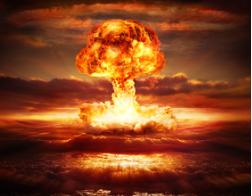By Kevin Judge | August 11, 2018
 Attempts to ban consumer products have inconsistent and often unsatisfactory results. Bans can influence supply and demand by limiting availability and increasing costs, there may still be demand at the price of acquiring the item illegally. Demand can be a hard thing to reduce and suppliers will emerge at the right price.
Attempts to ban consumer products have inconsistent and often unsatisfactory results. Bans can influence supply and demand by limiting availability and increasing costs, there may still be demand at the price of acquiring the item illegally. Demand can be a hard thing to reduce and suppliers will emerge at the right price.
Given the poor results in prohibiting alcohol in the 1920s and the difficulties in banning and regulating narcotics today, you would think that politicians and diplomats would have a sober (pun intended) view of arms control efforts that attempt to ban or limit weapons of mass destruction.
Unfortunately, reality is not particularly fashionable with those practicing international diplomacy. They just don’t grasp that weapons of war are subject to the same market forces as marijuana or toothpaste.
Over the last century, way too much confidence has been placed on agreement that rely on the good word of despots and authoritarian regimes. Such bad actors rely on the use of force to remain in power in their countries. They may pay lip service to arms control, but they will do whatever it takes to avoid regime change. Under the circumstances, this may be totally rational given how such regimes often meet their ends. From Tsar Nicholas to Muhammar Khadafy, retirement from office also means exiting the mortal coil.
 Diplomatic agreements may be a necessary process and provide structure for relationships, but long-term success in controlling the use of weapons of mass construction depend on the same economic factors as for any product. You must address the fundamentals of cost and need that determine the current level of demand.
Diplomatic agreements may be a necessary process and provide structure for relationships, but long-term success in controlling the use of weapons of mass construction depend on the same economic factors as for any product. You must address the fundamentals of cost and need that determine the current level of demand.
The supply of weapons available is more related to the cost and technological limitations than to changes in demand. In other words, if the cost is right there are always buyers. Relatively inexpensive and technologically proven we opens such as automatic weapons are almost impossible to limit access to, and their use is almost universal.
The same can be said for chemical weapons, but not as much for their use. The conventional wisdom is that the horrific nature of such weapons makes them morally unacceptable to most countries to use. There is some truth to that, but too many regimes would not let moral niceties interfere with the use of weapon if they see it as effective in a conflict. To those regimes, the main deterrent for use is the difficulty in deployment. Their effectiveness may literally depend on which way the wind blows.
Nuclear weapon in contrast are very expensive to produce and require a long term effort, the kind that only a nation state can employ. Fortunately, those who already have nuclear weapons have been unwilling to part with them. The same cannot be said of related technology, which countries like Russia and North Korea have been willing to share for a price.
The Obama Administration believed that they could negotiated a nuclear arms agreement with the Mullahs of Iran based on rewarding good behavior. This is fundamentally flawed because it does not change the authoritarian and expansionary nature of the regime, driven by religious and ideological beliefs. They want nuclear weapons to threaten their enemies and deter attack from them. No country with nuclear weapons has ever been attacked by a foreign enemy.
However, governments of nuclear powers that have fallen from within include the Soviet Union, Pakistan and South Africa. Regime change is the first and best way to reduce the demand for nuclear weapons. Democracies are not perfect, but there has never been a war between two democracies in modern times. The more democratic and pluralistic a country is the less likely it is to need force to control their populations or threaten their neighbors.
America’s recent experience with regime change by force has not been a pleasant one. Creating more benign regimes in Iraq and Afghanistan has been costly in blood and treasure and has produced tenuous results. Regime change may be the ultimate solution to the threat of a nuclear result, but the change will have to come from within.
The good news is there is significant support for change among the Iranian people and a desire among many for good relations with the United States. Exactly how much is uncertain and American support for the Iranian opposition cannot be perceived as internal interference, even if it is.
Other than military action, costs are best imposed using economic tools. The Trump Administration is currently reimposing sanctions on Iran that were lifted by the Obama Administration. It is generally agreed that costs imposed on the Iranian economy and leadership by the sanctions is what brought the Mullahs to the negotiating table in the first place.
